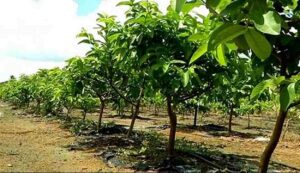Guava Cultivation: A farmer from Mehsana district cultivated this fruit, now it is raining money
Guava Cultivation: The Mehsana district’s Akhaj hamlet is known nationwide for its guavas. Thanks to their diligence and technological advancements, the farmers in this area are cultivating guavas with remarkable success. The name of 65-year-old Purushottambhai Magandas Patel is particularly well-known among these farmers. At an annual expenditure of only Rs 5,000, he is making Rs 70,000 per bigha.

Years of expertise and a large income at a reasonable price
For the last several years, Purushottambhai has been growing custard apples, lemons, and guavas. Additionally, he makes and cuts local guava types like “Lucknow 49” and “Goddia” in order to sell them. He claims to have been growing guava since 1978 and to have discovered how crucial it is to care for the stems. Every day, he walks around the trees and takes care of any pests or illnesses right away.
Improved farming using natural techniques
Purushottambhai asserts that guava stems may remain robust and smooth without the need for outside medications. They maintain the trees’ vitality for years by using kerosene and moist soil. The cost of upkeep is about Rs 1,000 per year.
Enhanced output with earthworm manure
Purushottambhai grows guavas using organic ways. In two and a quarter bighas, he uses ten sacks of earthworm manure. Additionally, he liquefies powdered Mycorrhiza and Dicocoderma and administers them to the plants. In two and a half bighas, this method yields 300 maunds of guava.
Hard work’s reward: earning millions of rupees
According to Purushottambhai, labor costs Rs 4,000 during the guava season. Guavas are purchased by traders who visit the farms directly. He therefore receives a total of Rs 1,40,000 in output.
A motivational tale
Farmers might find inspiration in Purushottambhai’s narrative. He demonstrated that every farmer can achieve great success with the correct technology and a lot of hard work by practicing inexpensive, sustainable, and organic farming.

